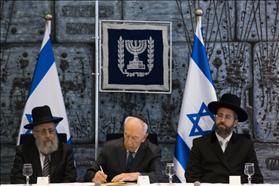The call for change grows louder...
Jerusalem Post Editorial: Dissolve the rabbinate
The 2013 Religion and State Index showed that 70% of Israeli Jews oppose the Chief Rabbinate in its current form. That includes Israelis from all over the Jewish spectrum. This time, it's the Jerusalem Post Editorial Board calling for the desperately-needed change.
29/09/2013 16:43
Tags: Chief Rabbinate · Freedom of marriage · freedom of religion · Jerusalem Post · editorial

Swearing-in ceremony for the newly elected Chief Rabbis in the presidential residence in Jerusalem. From the left Chief Sephardic Rabbi Yitzhak Yosef , President Shimon Peres
According to the State Servants’ Code of Regulations (“takanot shirut ha’medina”), the chief rabbi of Israel – and any other rabbi, priest, sheikh or religious judge that receives a salary from the state of Israel – is forbidden to be involved in political activity.
Clause 42.322 states specifically that during municipal elections “it is prohibited to participate in the public meetings of political parties or political bodies or give speeches on any subject, because the very appearance of the state employee on the stage of a political party is liable to create the impression of political affinity.”
On Friday, newly appointed Chief Sephardi Rabbi Yitzhak Yosef, gave a speech during a political event for Shas in the predominantly haredi city of Bnei Brak that marked the launching of the political party’s municipal election campaign there, Israel Hayom reported Monday.
Yosef’s public appearance at the event seems to constitute a violation of the above mentioned penal code. It is also yet another example demonstrating the pressing need to dissolve the Chief Rabbinate and to separate as much as possible religion from state. The idea that the State of Israel has the power to restrict a religious figure’s freedom of expression in political matters or any other matter of conscience or opinion is repugnant.
Indeed, the founders of modern democratic thought who called for the separation of church and state were primarily concerned with protecting the freedom of conscience of the religious. At the same time, however, rabbis and other religious figures – Jewish or not – should not receive a salary from the State of Israel and the rabbinate should be dissolved. Israel is, and should remain, a Jewish state. But this goal is best accomplished through legislation such as the Law of Return, laws governing Shabbat as a day of rest and Jewish holidays as national holidays and laws ensuring that kosher food is served in the IDF and other state institutions.
However, Israel should avoid empowering religious individuals or groups with clear political affiliations. That’s because when these individuals or groups gain control over the Chief Rabbinate or the Religious Services Ministry they inevitably exploit their position to further the narrow interests of their constituents.
Ideally, chief rabbis should use their positions to present a more accommodating, relevant and meaningful form of Judaism to the greater Israeli populace. But Israeli society is too diverse.
In Yosef’s case it means taking advantage of his new powers to further the interests of Shas, a party established by his father. Yosef will be tempted to exploit the Chief Rabbinate’s monopoly over kosher food supervision to advance the Beit Yosef kosher supervision apparatus run by the Yosef family. And since the Chief Rabbinate has influence over the appointment of neighborhood and city rabbis and the chairmen of religious councils, Yosef may work to appoint cronies close to Shas.
The Ashkenazi Chief Rabbi David Lau will be under similar political pressure to advance the interests of the Ashkenazi haredi establishment. And if a religious Zionist candidate had been elected as chief rabbi, the narrow interests of this specific group would have been advanced. Ideally, chief rabbis should use their positions to present a more accommodating, relevant and meaningful form of Judaism to the greater Israeli populace. But Israeli society is too diverse.
Unsurprisingly, few feel the Chief Rabbinate represents them. Haredim have their own rabbis and spiritual leaders and do not rely on, or even trust, the kosher supervision of the Chief Rabbinate. Secular Israelis are increasingly turning to alternative expressions of Judaism, whether Orthodox groups such as Tzohar rabbis, Chabad, Breslav; non-Orthodox movements; or non-denominational movements such as Jewish renewal groups Nigun Halev, Beit Tefila Yisraelit, or Beit Midrash Alma.
Also, there is an inherent contradiction between the religious faith of men like Yosef and the upholding of democratic principles that enable basic freedoms such as gender equality or the fair treatment of non-Orthodox streams of Judaism. Meanwhile, forcing chief rabbis to appoint women as heads of religious councils or to recognize non-Orthodox streams of Judaism is an infringement of their religious autonomy.
The freedom of expression of religious figures such as Yosef should not be restricted by the state in the form of laws like clause 42.322 of the State Servants’ Code of Regulations. At the same time, the State of Israel must protect its democratic character. The best way to achieve both these goals is by separating as much as possible the involvement of the state in religion. Dissolving the Chief Rabbinate is an important first step.
This article originally appeared in the Jerusalem Post.